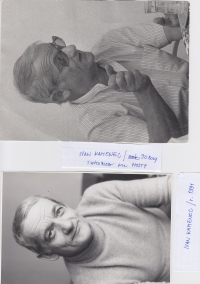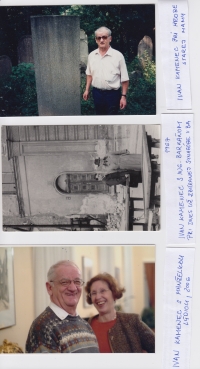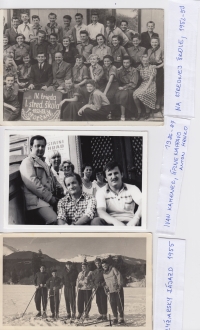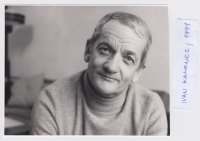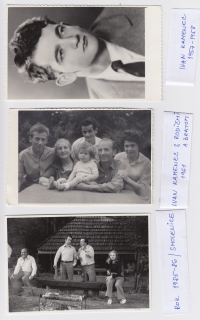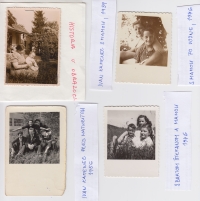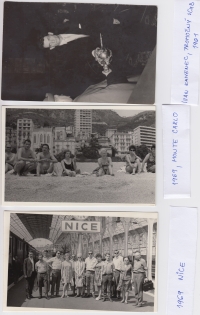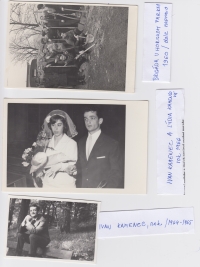PhDr., CSc. Ivan Kamenec
* 1938
-
I can ask more, the year 1968, August and the invasion of troops. How you experienced it, I mean in what situation.
But it was, that the sixty-eighth year was recorded for me by two events. A daughter was born in January, that was then, she was the center of my world, and also there was an occupation in August. I know that at this time we still lived with our mother-in-law. We didn't have the apartment yet, even though we were so near to this. Well, and then I was really shocked. I did not believe that the occupation would take place, although foreign radio kept talking about it and saying that the Soviets did not want to admit it. I will return to what happened in the thirty-ninth, in the forty. Even the people who were in this period, they did not believe that something could happen, although it could not be compared mechanically. It was something completely different, but no one believed it. My focus at that time was my daughter, my wife. And then there was what happened. I connect with that. We were supposed to move to Petržalka in August, where we currently live, we had a cooperative apartment. And we had, we already brought such small things there, I was still working in the museum. They gave me one such van there, they said, you can take some small things with it, and on August 23rd we ordered a truck that, as far as I know, took some cabinets there. At that time there was an old bridge in Bratislava and we didn't get there. The occupation was on Wednesday, and it began to be said that the apartments were occupied by Soviet soldiers. On Sunday we dared to walk to Petržalka, so the park was still completely occupied by Soviet soldiers, but it was already possible to cross the bridge. And we started carrying things back, the little ones. Well, I already had my clothes there, already. But then sometimes in the mid-September, we definitely moved there. So it was a shock, but we had to continue to live and.
You were not involved in the protests.
Sorry?
You probably did not engage in protests against the occupation.
I wrote a few letters like that. That before and after where they lived, how, how. Firstly I know about the meeting in Čierna nad Tisou was signed, that we are with you, be with us. These sheets were on every corner, as you can say.
-
Can I come back a little bit? Mr. Kamenec, you moved to Topoľčany, which is a very specific town with your own family history during the Second World War. How did you perceive the events in Topoľčany that took place?
When it happened in Topoľčany, the so-called Jewish pogrom, so we haven't been there yet. That was in September 1945, we still lived in Janova Ves. But I know it was talked about, at home. Of course I didn't understand it, I was seven years old, so. But I found friends in Topoľčany and I went to these events, then returned as a historian, when I also wrote about them. But.
And as with you, in your family, you mentioned that your father's business was nationalized.
Come on, like everyone else. It wasn't, it was a building company.
And, but, how your parents perceived it, after surviving all of this, during World War II, and then the beginning of the next regime.
But, you. We, I mean the nationalization. So they probably didn't like it, because my father couldn't make his own business. He remained working in construction building, working in various companies as construction plants and I do not know. But, you know, the hierarchy of those values was already completely different. The important thing was that we survived and that whether they took the construction company from him or not, he probably didn't like it, but when he compared it to what was before, he probably came to terms with it much easier. But then the inconveniences began. You well, there was background checking always. But then I didn't talk about this with my parents, but even then we were thrown out of the apartment in Topoľčany as a former capitalist. It was not part of Action B, so they moved them out completely somewhere. They did this mainly against the citizens of Bratislava, but they let us live in one such apartment. We had a very comfortable apartment in Topoľčany, so nice. And then they let us live in another house, where as far as I know, three families had a kitchen and accessories together. So it was not pleasant, but I say, all of this, it was unlike what happened during the war, not that negligible, but it wasn't the most important thing.
-
Let's go back maybe so let's try to go through time. You, when you were born, it was in the time before the establishment of the Slovak state. You can't remember that.
No.
Context. But, maybe even from the story of the parents and the vicinity, you know how they perceived it. So your father got an economic exemption, but how was the mood? Maybe even between the majority and the minority of Jewish origin.
I don't know. I think it depends on everyone, of course the individual, and we were in that bunker, for seven months. And there, those people actually saved us. So maybe there was a mood, they had no prejudices and they were deeply religious people. They.
You mentioned that your family converted to another.
Sorry?
That you mentioned that your family converted.
Yes.
To another religion.
Yes, but what's here. That origin still remained, they did not recognize it when someone converted, because in Slovakia, then racial legislation was introduced in the fortieth-first. The Jew was no longer used, considered, defined by religion, but by the origin of the race.
And when did your parents convert?
In the fortieth-second. That is, at a very bad time, when the deportations began, but apparently they were preparing for it. I don't know, I didn't talk to them about this, because some things have to be left as such. I could talk to them and ask questions, but because my parents were close to me, I didn't decide for this.
And do you know who baptized them, or?
Sorry?
That if you know who helped them to convert.
Yes, I remember, a village pastor was there. He was called Rus. I remember him so foggy, and most converts were going, they were converting because they wanted to save themselves, and then were going back to their original religion. And my parents were not like them.They stayed with the new religion.
-
Celé nahrávky
-
ateliér Holubník, 29.10.2020
(audio)
délka: 02:14:11
Celé nahrávky jsou k dispozici pouze pro přihlášené uživatele.
„I was born in a not good time, because then, especially for families that did not have a good background, the right one.“
The memorial, Ivan Kamenec was born on August 27, 1938 in Nitra. The place of his birth was accidental, as his mother was taken to a hospital in Nitra due to health complications during pregnancy. A few weeks after his birth, he went back home with his mother to Janova Ves, which is currently a local part of Klátová Nová Ves near Partizánske.
Ivan‘s father, Dezider, came from Berkov na Považí and worked in the village of Janova Ves as a construction technician. The memorial‘s mother, Alžbeta, was more than six years older than her husband and worked as an accountant in her hometown, Janova Ves. She worked on the estate of the doctor Edmund Nešner, who at worst hid them in his mansion. Ivan had an older brother, Štefan. Their relationship became harmonious only in adulthood.
Until 1944, Ivan‘s family was granted an economic exemption due to his father‘s construction work. When all exceptions expired, his family was forced to hide in a bunker built by his father after returning from the Slovak National Uprising. They hid there for more than seven months, and their food supplies were brought to them all the time by the villagers, who thus exposed themselves to danger.
Due to his stay in the bunker, Ivan never entered the first year of primary school. After the liberation in April 1945, his family returned to normal life. In September 1945, Ivan entered the school, where he attended the so-called „single class“. It was a class in which children from the first three year-class were together. After elementary, then folk school, he decided to enter an 11-year high school, a grammar school, where he graduated in 1956. He continued to choose the university in which the Faculty of Arts in Bratislava won. During his studies, he did not miss the compulsory two-year military service, in the years 1961 to 1963.
Although he did not consider the beginning of the communist regime to be good, it was incomparable with life during the war. His family did not avoid the typical cadre or nationalization of his father‘s private construction company, but all this, could be survived. After the war, Ivan managed to work at the Slovak National Museum, where he worked for six years, until 1969. Later, he began working at the historical institute of the Slovak Academy of Sciences, where he still works.
He met his wife Lýdia Szabová at the turn of 1964 and 1965. Shortly afterwards, in 1966, they had a wedding and lived together for a beautiful 51 years. His only daughter was born in 1968, and she is currently his only immediate family. They have a wonderful relationship and they are a great support to themselves after their mother‘s death.
